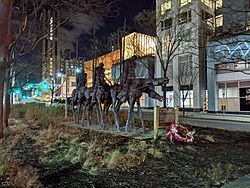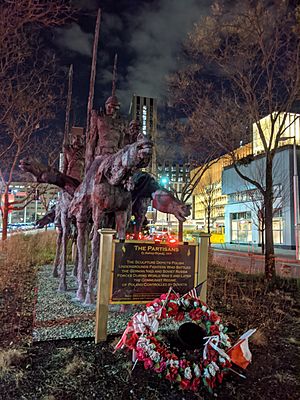The Partisans (sculpture) facts for kids
Quick facts for kids The Partisans |
|
|---|---|
 |
|
| Artist | Andrzej Pitynski |
| Year | 1983 |
| Type | aluminum |
| Dimensions | 7 m × 4 m × 10 m (280 in × 160 in × 390 in) |
| Location | Boston, Massachusetts |
The Partisans is a large sculpture made of aluminum. It was created in 1979 by a Polish-American artist named Andrzej Pitynski. Since 1983, you can see it in Boston, Massachusetts. This artwork shows Polish fighters who stood against communism. It is a tribute to all freedom fighters around the world.
What Does The Partisans Sculpture Look Like?
The sculpture is 10 metres (33 ft) long. It is also 7 metres (23 ft) high and 4 metres (13 ft) wide. This modern aluminum artwork shows five riders on their horses. The horsemen carry spears on their backs. Their heads are bowed, which shows ideas of sacrifice.
The artist, Andrzej Pitynski, said the sculpture represents:
Five armed riders in a marching formation; five desperate men who resemble forest ghosts more than they resemble human beings ... five partisans who are tattered, mortally tired, who are bleeding from endless battles, escapes, skirmishes ... immersed with their own thoughts about the tragedy of their nation, who are riding their horses, stumbling from exhaustion.
The sculpture is a symbol of the "cursed soldiers". These were Polish fighters who resisted the communist government. They fought after World War II when communists took over Poland. The artist dedicated his work to "all freedom fighters around the world."
The Story Behind The Partisans Sculpture
Pitynski designed the sculpture in 1979. He created it for the Johnson Atelier – The Technical Institute of Sculpture. The Sculpture Foundation helped pay for it. Some people did not like the sculpture's message. The artist even received threats because of it.
The sculpture has been in Boston since 1983. At first, it was only meant to be there for a short time. But it became a permanent monument. Until 2006, the statue was on Boston Common. It was near Charles and Beacon streets. City officials moved it to a warehouse. They said it needed a proper base. This made the Polish-American community upset. The artist was also unhappy.
In July 2006, the statue moved to a new public spot. The Massachusetts Bay Transportation Authority (MBTA) helped with the move. It was placed on the South Boston waterfront. This was near the Boston Institute of Contemporary Art. It was also close to the MBTA's World Trade Center Station. The statue was celebrated again. Polish-Americans and local officials attended. The artist and the Polish Consulate in Boston approved of the new location. On November 17, 2018, the statue moved one last time. It is now in the middle of D Street, where it meets Congress Street.


